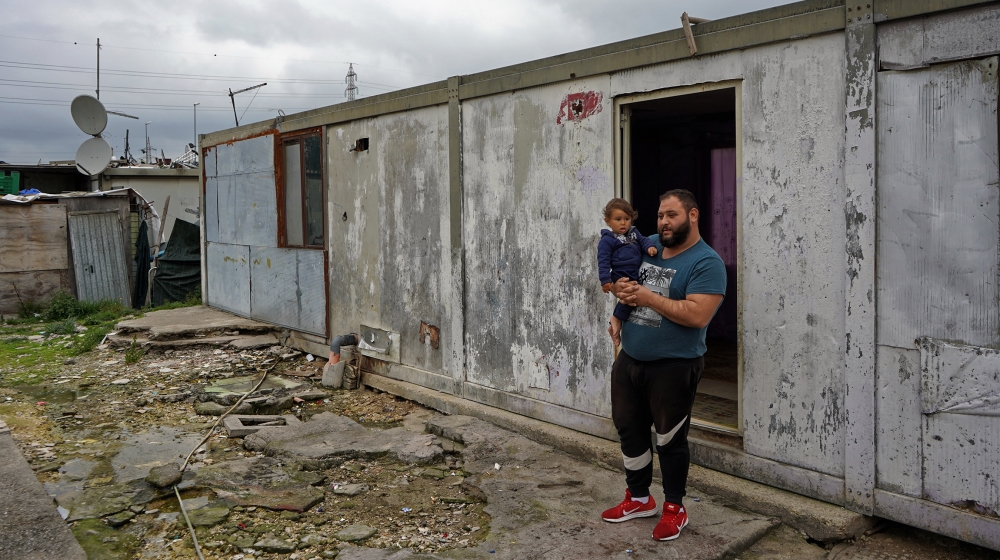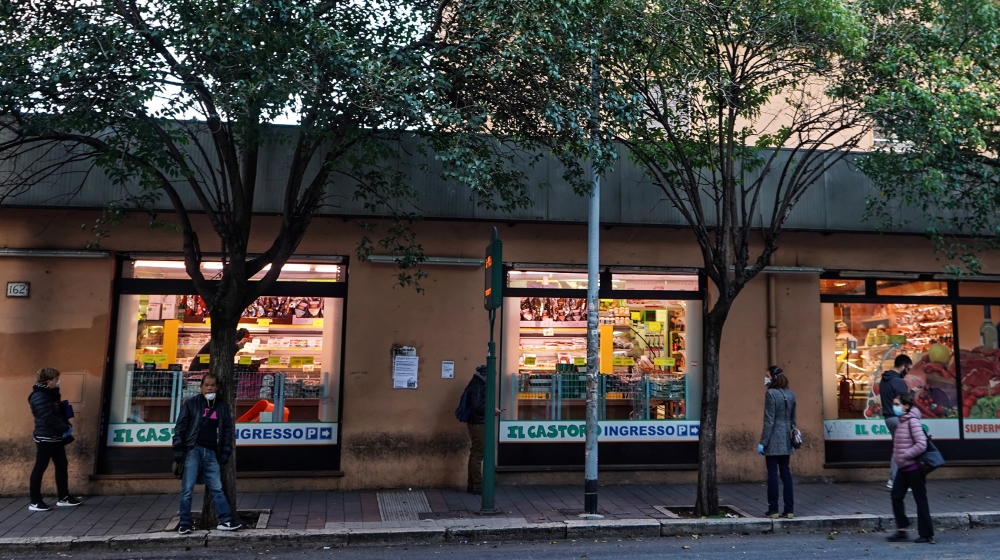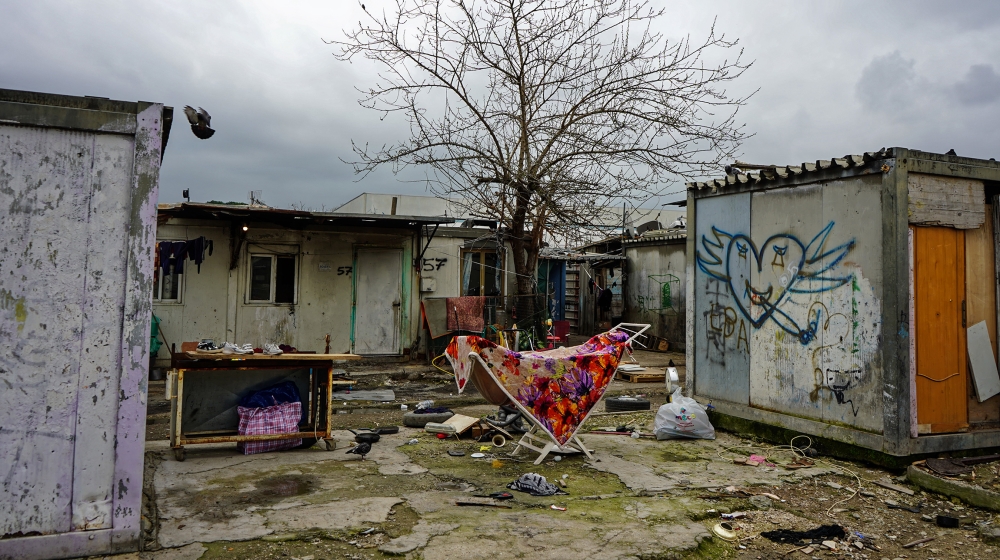Without safe homes or jobs, Italy’s Roma fear coronavirus impact
Following quarantine rules is near impossible for many Roma, who do not have financial backup or job security.

Rome, Italy – Weeks into Italy’s national quarantine and social media has been overtaken with rosy footage of sunset balcony serenades.
But vulnerable communities are still struggling with the country’s strict lockdown measures.
Keep reading
list of 4 itemsMexico’s teachers seek relief from pandemic-era spike in school robberies
‘A bad chapter’: Tracing the origins of Ecuador’s rise in gang violence
Why is the US economy so resilient?
At a Roma camp on Via Salviati, on the outskirts of the capital, an olive-green military cruiser sits parked outside the crowded, dilapidated settlement – home to 100 or so families living side-by-side in caravans.
A constant police presence ensures that the camp abides by Prime Minister Giuseppe Conte’s decree, announced on March 9, that banned all non-essential movement.
“They are always there. But they don’t help us with anything,” says 28-year-old Zdravko Ahmetovic, who has not set foot outside the camp since Conte’s public address.
“If I go out they’ll put me in prison or give me a fine [for 206 ($230) euros].”
Elsewhere in Rome, house-bound Italians are working remotely, providing smartphone-supported school lessons to their children, and enjoying rooftop yoga sessions on Zoom.
But underneath the ubiquitous hashtag #iostoacasa (“I stay at home”) is concern about the unequal effects of coronavirus and virus-related restrictions – so much so that Rome-based Binario 95, which offers support to homeless populations, rolled out its own hashtag: #iovorreistareacasa (“I would like to stay at home.”)

For Roma families in the camp, who scrape by on meagre, hand-to-mouth earnings reselling iron scraps or used clothing in weekly mercatini, or flea markets, the Italian government’s decree poses both unique health risks and a critical economic hit – a virtual death sentence when it comes to maintaining precarious livelihoods.
“They can’t work. They don’t have money for food,” said Rosi Mangiacavallo, Italy facilitator for the European Roma Rights Centre (ERRC), a Roma-led litigation and advocacy organisation. “The fact that they are already living on the margins makes this a really difficult situation.”
Roma are known as Europe’s largest and most persecuted ethnic minority.
There are between 150,000 and 180,000 in Italy; most are indistinguishable from other Italians.
But an estimated 30,000, many Italian-born, or from former Yugoslavia or Romania, live in camps like the one on Via Salviati, known as campi nomadi – literally, nomad camps.
The designation (“nomadi” and “Rom” are used interchangeably in Italian) leans on the spurious perception of Romani people as inborn wanderers, a stereotype often weaponised to deny them stable employment or to justify camp expulsion orders.
These local prejudices have a long and persistent history, notes Mangiacavallo.
When Roma began settling in Europe in the 14th and 15th centuries, “that’s the time when nation-states were forming, when borders were being decided,” Mangiacavallo said. “They were outsiders, with different cultures, different ways of living.”
Driven from cities, “they became the enemies”.

The rapid spread of COVID-19 has laid bare many shaky social and political fault lines around the globe.
Italy has shown how the precarious living conditions of the most vulnerable communities – not only Roma camp residents, but also refugee and migrant populations and the homeless – are likely to make them the hardest hit.
Annie Wilkinson, a health systems researcher at the Institute of Development Studies, saw first-hand the impact of the Ebola virus on informal settlements in Liberia and Sierra Leone.
“Whole slum areas were put under quarantine,” said Wilkinson, which were then guarded by the army or police – with no infrastructure set up to replace lost livelihoods. “People ended up breaking quarantine, because they simply had to survive.”
Densely populated, usually with multi-generational households, and often with minimal sanitation or running water, slums and camps are not conducive to the current coronavirus prevention measures. Social distancing is simply impossible.
According to the ERRC, more than half of Romani people rely on water sources located more than 150 miles away from their homes.
“People simply for lack of running water or space cannot do the primary things that people are being told to do,” said Wilkinson, referring to the basic guideline of frequent handwashing.
“There can be a whole criminalisation of not adhering to control measures that were inappropriate for those groups to begin with,” added Wilkinson, while antagonistic relationships with police or government can “put them at risk for further persecution”.
The specific prejudices against Romani communities have also had repercussions when it comes to the handling of coronavirus cases.
Rosi Mangiacavallo points out that media reports in Italy that deal with Roma are relentlessly negative, focused on robbery and petty crime.
“When a Roma person commits a crime, the guilt is seen as collective and not individual, belonging to the whole community.”
Similarly, when it was discovered that a resident of the Roma camp of Cuneo, in Italy’s northern Piedmont region, had come into contact with a coronavirus-infected person, the entire camp of 50 people was quarantined together.

Back in Via Salviani, Zdravko’s mother, wife and extended family are keeping to themselves in their sparse, lilac-walled caravan, nervous about steeply rising infection rates and the household’s ability to cope without savings or income.
Every Sunday, the Ahmetovic family used to travel to Porta Portese, the city’s biggest flea market, sprawled near the banks of the Tiber River, to sell their wares.
Now it remains closed, along with all Italian businesses deemed inessential.
The family only leave home one at a time, if at all. Queuing for groceries can take up to an hour, longer when the police check each bag at the entrance to the camp.
Zdravko says that a few Roma families from Via Salviati have even fled the country.
Standing inside their open door, 38-year-old Mejra Ahmetovic peers out onto a cluster of pale grey caravans – close neighbours.
“How will we live without work?” she worries aloud.
Outside, the military vehicle sits idle, police and the army still coming and going, keeping watch.
“They say, ‘Don’t go out,'” she says, a catch in her voice. “But then, they have to help us.”